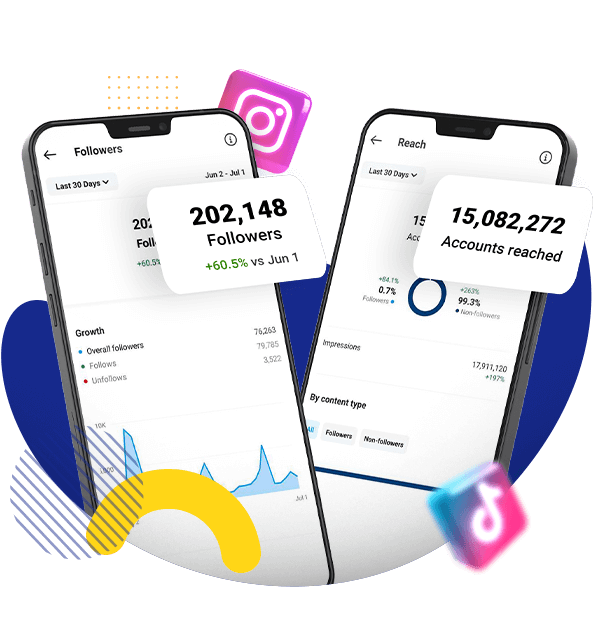Page Contents
In the era of digital transformation, social media analytics for marketers has emerged as a transformative force, transcending traditional marketing boundaries and empowering brands to forge meaningful connections with their target audience.
It has become an essential tool in the arsenal of modern marketers, enabling them to propel brand awareness, foster engagement, and drive unprecedented business growth.
Yet, in the vast expanse of social media’s limitless potential, lies an untapped wellspring of opportunity that awaits those who dare to venture further – the realm of social media analytics for marketers.
By delving into the realm of data-driven insights, marketers can transcend the realm of guesswork, making strategic decisions grounded in the empirical evidence obtained from in-depth analysis.
This article stands as a beacon, guiding through the uncharted waters of social media analytics for marketers, empowering them to unlock its transformative power and achieve unparalleled success.
Understanding the Importance of Social Media Analytics for Marketers
The process of collecting and analyzing data from multiple social media platforms to acquire insights into audience behavior, content performance, and campaign efficacy is known as social media analytics.
Social media analytics for marketers is crucial as it helps them learn a lot about the preferences, interests, and demographics of their target audience by exploring social media statistics.
These insights give marketers the tools they need to make data-driven decisions, customize their content, and maximize the effectiveness of their marketing techniques.
– Jeff Romero, Founder of Octiv Digital
Defining Key Performance Indicators (KPIs)
To effectively measure the success of social media marketing campaigns, it is essential to define relevant Key Performance Indicators (KPIs).
KPIs are specific metrics that reflect the goals and objectives of a marketing campaign. Common social media KPIs include engagement rate, reach, click-through rate, conversion rate, and sentiment analysis.
By setting measurable goals and tracking these KPIs, marketers can gauge the performance of their social media initiatives, identify areas for improvement, and master social media tactics.
– Gerrid Smith, Communications Manager at TEXAS PROPERTY TAX LOAN PROS
Choosing the Best Tools for Social Media Analytics for Marketers
There are many tools on the market when it comes to social media analytics for marketers, and each one has different features and functionalities.
Consider features like usability, data accuracy, reporting abilities, and social media platform integration when choosing the best solution for your purposes.
Sprout Social, Hootsuite, Buffer, Google Analytics, and Brandwatch are a few well-known social media analytics programs. Determine your needs and select a product that fits your objectives, spending limit, and level of experience.
– Ethan Bull, Owner of ProAssisting
Examining the Audience’s Insights
Developing in-depth information about your target audience is one of the major benefits of social media analytics for marketers. They can more fully grasp the interests of their audience and adjust their messaging by using demographic information like age, gender, and region.
Additionally, by examining audience behavior such as interaction trends and content preferences, marketers may improve the effectiveness of their social media campaigns and modify their content strategies.
– Kim Leary, Creative Director at squibble
Monitoring Content Performance
Social media analytics for marketers is great to evaluate the performance of their content across different platforms. By tracking metrics like likes, shares, comments, and click-through rates, marketers can determine which types of content resonate best with their audience.
This insight helps in creating more engaging and relevant content that drives higher engagement and conversion rates. Additionally, analyzing content performance over time can reveal trends and patterns that can inform future content strategy.
– Tiffany Hafler, Marketing Manager at Fortis Medical Billing
Measuring Campaign Effectiveness
Social media analytics for marketers plays a vital role in measuring the success of marketing campaigns. By tracking campaign-specific metrics such as reach, impressions, conversions, and return on investment (ROI), marketers can evaluate the effectiveness of their social media initiatives.
This data allows them to identify successful strategies, allocate resources effectively, and optimize campaigns for better results. Measuring campaign effectiveness also enables marketers to justify their social media marketing investments to stakeholders.
Leveraging Real-Time Monitoring
Real-time monitoring features offered by social media analytics platforms enable marketers to keep track of discussions, trends, and brand-related comments.
This real-time information enables marketers to spot engagement opportunities, quickly address customer questions or complaints, and actively manage their brand awareness campaigns.
Real-time monitoring also helps marketers spot new trends or problems in their sector, giving them an advantage over rivals and allowing them to adjust their strategy.
– Marie Ysais, Founder of Ysais Digital Marketing
Utilizing Competitive Analysis
Social media analytics for marketers allows them to gain insights into their competitors’ social media strategies and performance. By analyzing competitors’ content, engagement metrics, and audience demographics, marketers can identify areas where their competitors excel and discover opportunities for differentiation.
This information can inform content creation, campaign planning, and overall strategy development. By keeping a close eye on competitors’ social media activities, marketers can stay competitive and make informed decisions to outperform them.
– Timothy Allen, Director at Corporate Investigation Consulting
Deriving Actionable Insights
The true power of social media analytics lies in the ability to extract actionable insights from the data. Marketers should go beyond surface-level metrics and dig deeper to uncover patterns, trends, and correlations.
For example, analyzing the correlation between specific types of content and higher engagement rates can help marketers refine their content strategy.
Similarly, identifying the peak times for audience activity can optimize the timing of social media posts for maximum visibility and engagement. By translating data into actionable insights, marketers can continually refine their digital brand strategies and drive better results.
– Dean Lee, Head of eCommerce at 88Vape
Iterating and Optimizing Strategies
Social media analytics is an iterative process. Marketers should regularly monitor and analyze data, evaluate the performance of their strategies, and make adjustments accordingly.
By identifying what works and what doesn’t, marketers can optimize their social media campaigns over time. A/B testing different content formats, experimenting with ad targeting, or refining audience segmentation based on analytics insights can lead to continuous improvement.
The iterative nature of social media analytics allows marketers to stay agile and adapt to evolving trends and consumer preferences.
– Sasha Quail, Business Development Manager of claims.co.uk
Conclusion
Social media analytics has become an indispensable tool for marketers seeking to drive better results and stay ahead of the competition. By harnessing the power of data, marketers can make informed decisions, refine their strategies, and maximize their social media marketing efforts.
From understanding the importance of social media analytics to leveraging audience insights, monitoring content performance, and measuring campaign effectiveness, each step is vital in unlocking the true potential of social media analytics.
By embracing this transformative power and allowing data to drive their social media success, marketers can navigate the rapidly evolving digital landscape with confidence and achieve unparalleled results.






